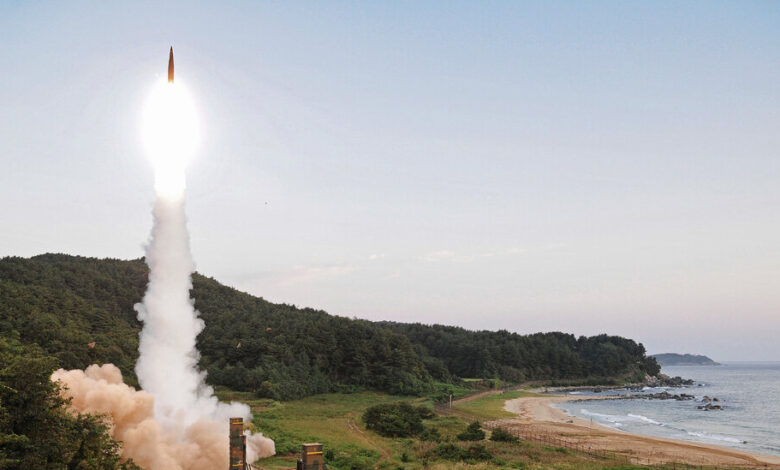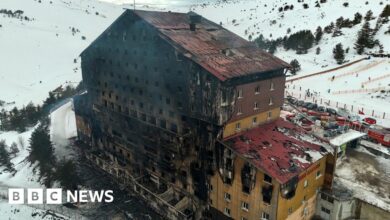Why many South Koreans want their country to have nuclear weapons

Since the Korean War ended in an uneasy truce in 1953, South Koreans have lived under the promise of the United States to defend their country, if necessary, with nuclear weapons. President Biden emphasize that pledge last year, declaring that any nuclear attack by North Korea would result in the destruction of its government.
But decades of US assurances have not stopped North Korea from building and then expanding its nuclear arsenal. Under Kim Jong-un’s leadership, North Korea has also become more provocative, testing missile powerful enough to reach the United States. And it has worried South Korea by reviving a Cold War-era defense agreement with Russia, another nuclear-armed state.
The South has long viewed its pursuit of nuclear weapons in defiance of Washington’s nonproliferation policy as taboo. But security concerns here have been heightened by the possible reelection of former President Donald J. Trump, whose commitment to the alliance between Washington and Seoul appears shaky.
Today, most South Koreans believe their country needs its own nuclear weapons rather than relying on the United States for protection. The idea, while still denied by the South Korean government, is increasingly becoming part of the mainstream political debate.
Polls show many South Koreans say they can no longer count on the US nuclear umbrella to protect them from North Korea. They doubt Washington would come to their aid in the event of a conflict with North Korea as Pyongyang races to develop the ability to strike US cities with nuclear warheads.
“We cannot expect — and should not demand — the US president to use his nuclear weapons to protect an ally at the risk of sacrificing his own people,” said Cheong Seong-chang, head of a group of 50 analysts in South Korea promoting a domestic nuclear arsenal. “We have to defend ourselves with our own weapons.”
South Korea abandoned its nuclear weapons program in the 1970s, when Washington pushed for nuclear nonproliferation, and chose to rely on the United States to defend itself against North Korea. Tens of thousands of American troops were stationed for decades in the South, which for many years also housed U.S. nuclear weapons. Washington withdrew those weapons in 1991, hoping that disarmament would encourage Pyongyang to stop pursuing its own nuclear weapons.
For a time, Washington had two important partners in that effort: China and Russia. But in recent years, Washington has found itself increasingly at odds with both countries over issues like trade tariffs and the war in Ukraine. Now, neither side cooperate in US-led efforts to roll back North Korea’s nuclear ambitions.
Mr Kim’s regime has tested both. nuclear weapons And intercontinental ballistic missile. It is developing technology to deliver multiple nuclear warheads with a single missile. It is also escalating threat targeting South Korea with a fleet of short-range ballistic missiles capable of carrying nuclear warheads, which Mr. Kim said this month he would deploy near the border with South Korea.
In June, the Stockholm International Peace Research Institute estimated that North Korea had built about 50 nuclear warheads and had enough fissile material for about 40 more. It is also focusing on tactical nuclear weapons, which have smaller payloads.
“There is growing concern that North Korea may intend to use these weapons early in a conflict,” wrote Matt Korda, a research fellow at the institute.
Such fears were sought to be addressed by South Korean President Yoon Suk Yeol when he met with Mr Biden at the White House last year. The two leaders have strengthened their alliance and signed Washington Declaration to demonstrate that America’s defense commitment is ironclad. Last month, they reaffirmed that any North Korean nuclear attack would be met with a “swift, overwhelming and decisive response.”
“For the first time, it is clearly stated in writing that US nuclear assets will be tasked with deterring and countering North Korea’s nuclear force,” said Kim Tae-hyo, deputy national security adviser to Mr. Yoon.
But that has not eased anxiety in South Korea about the US nuclear protection relationship, which also includes Japan.
ONE probe A February poll found that the percentage of respondents who said Washington would defend their country with nuclear weapons even if North Korea could hit the continental United States with a nuclear missile fell to 39 percent from 51 percent last year. Another surveyconducted annually for a decade, found a historic shift. When asked to choose between having nuclear weapons or US troops on their soil, more South Koreans, for the first time, chose nuclear weapons.
Other surveys found that as many as 70 percent of South Koreans support an independent nuclear arsenal. This is becoming increasingly popular among conservative politicians And private and government analysts to support or discuss ideas, especially after Russia’s invasion of Ukraine has highlighted the extent to which a nuclear-armed power can invade a non-nuclear-armed neighbor.
“The call for nuclear weapons will not last long because ‘producing nuclear weapons’ sounds appealing as a slogan,” said Lee Byong-chul, who studies nuclear nonproliferation at the Institute for Far Eastern Studies in Seoul. “But there is a huge gap between high public support and a lack of technical capacity and political will to build nuclear weapons.”
South Korea has no nuclear bomb fuel production facilities or the technical know-how to design nuclear weapons. And while Mr. Yoon has been more hostile toward the North than his recent predecessors and in a short time warm with ideas in a context where there was little political will in the South to pursue nuclear weapons.
Analysts say the enhanced reconnaissance and missile capabilities would better serve South Korea and give it the ability to launch a preemptive strike on North Korea.
Chun Yung-woo, a former national security adviser, said building nuclear weapons would be “redundant” and “would not make South Korea safer” “as long as the South Korea-US alliance exists and thrives.”
But the future of that alliance could be in doubt if Mr Trump – who has tried to negotiate directly with Mr Kim – is re-elected in November.
“It’s great to get along with someone who has a lot of nuclear weapons,” Mr Trump said of Mr Kim when he accepted his party’s presidential nomination last month. “I think he misses me, if you want to know the truth.”
For domestic nuclear advocates in South Korea, the possibility of Mr Trump returning to power could be a good thing. have said He would agree to allow Japan and South Korea to build their own nuclear arsenals instead of relying on the US nuclear umbrella.
“It could open up an opportunity,” said Mr. Cheong, the pro-nuclear analyst.



